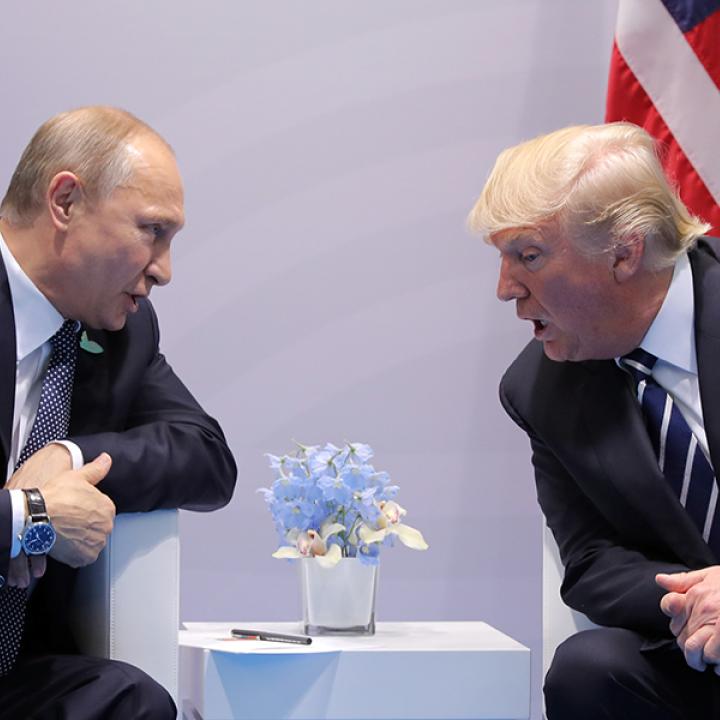
- Policy Analysis
- Articles & Op-Eds
What Trump Should Have Asked Putin For: Ground Rules for the U.S.-Russia Relationship

A sensible approach would entail cooperation where U.S. and Russian interests converge, such as on proliferation, terrorism, and drugs, and management where they differ, such as on Iran.
The Trump-Putin meeting on the margins of the G20 summit came at an important time. Not because of the investigations into whether there was collusion during our election. Nor because a grand deal between the U.S. and Russia is possible; it is not -- Russia will neither give up its leverage in eastern Ukraine nor walk away from Bashar al Assad. The former for Putin is part of Russia's sphere of influence and the latter ensures a new Russian foothold in the Middle East -- and neither will be seen by Putin as tradeable assets.
So why was the timing important? Because it is time to re-establish ground rules for the relationship. Putin likes to say there should be no intervention in the domestic affairs of others -- but he means only no intervention in Russia's internal affairs; he is clearly intervening in the domestic politics of others, and it needs to stop. According to Secretary of State Rex Tillerson, the President did push on Russia's intervention in our election. Regardless of whether one accepts the Tillerson or the Lavrov accounts of the conversation, it is clear that the Trump administration wants "to look forward" and has little interest in imposing any price for Russia's meddling. That is not the way to deter further such interventions by the Russians, but maybe Putin will forgo them in the hopes of building his relationship with President Trump.
I hope the President used his discussion with Putin to set down some ground rules, including cooperation where our interests converge -- e.g., on proliferation, terror and drugs. And, where they diverge, e.g., Iran, we will try to manage our differences.
Contrary to the conventional wisdom, Putin is not a big risk-taker. His use of "little green men" at the outset of Russian interventions -- sending in forces without insignia or uniforms, and only later saying that they are Russians who've gone to volunteer -- is his way of testing the reaction, preserving deniability, and avoiding the appearance of a loss if there is serious pushback. What he found with the Obama administration was that the pushback would be very limited -- there would be no lethal assistance to Ukraine, which might have raised the costs to the Russians; there would be no response to Russia's stealthy intervention in Syria by increasing the weaponry to those fighting the Assad regime. Where Putin finds little or no resistance, he is quick to take advantage of it.
From the Tillerson read-out of the Hamburg meeting, one can't tell whether any such ground rules were established and whether Putin now understands there will be pushback when he crosses certain thresholds. Tillerson said nothing about existing sanctions on the Russians, and that is good news. If thresholds are to be respected, walking back sanctions without Russian actual implementation of the Minsk accords on Ukraine would be a mistake.
In Syria, an understanding appears to have been reached on creating a safe zone of sorts in southern Syria opposite the Jordanian border. It, of course, is not the first time agreements with the Russians have been reached on Syria; the proof that this one is different will come only when we see the Russians impose a price on the Assad regime when it inevitably violates the understanding. Unless Putin understands that we will punish the Assad regime if he does not, I fear this deal will go the way of its predecessors.
If the secretary of state had not said that the Russians may be more right than we are in Syria, I might have more confidence in this deal, particularly because his words signal we accept the Russian actions in Syria. Leaving aside its extensive bombing of civilians, the Russians are presently abetting the power of Iran -- and Iran and its Shia militia proxies are building a land corridor through Iraq and Syria to Lebanon, reflecting their aim of trying to control the Syrian borders with Iraq, Jordan and Israel. Notwithstanding our focus on ISIS, Putin must know that we will block an outcome that could destabilize Jordan and open up a second front outside of Lebanon against Israel.
Ironically, such a posture might be consistent with the understanding Tillerson announced -- assuming the Russians will respect these limits and stop providing air cover for the Shia militias as they seek to expand into eastern and southern Syria. For our part, we would not threaten the existing Russian, Syrian or Iranian/Shia positions. Iran's presence would be contained, not reversed. We would be accepting what exists and the prospect of a de facto partition of Syria.
That is the kind of deal Putin would understand. It won't fix Syria, but it could stop the carnage and even make safe areas for refugees possible. It would also blunt the Iranian expansion and reassure the Gulf States that the Iranian threat will be contained -- something that could give them an incentive to reduce sectarian conflicts in the area.
A grand deal it is not, but it might be a good place for this President to start with Putin.
Dennis Ross is the counselor and William Davidson Distinguished Fellow at The Washington Institute and former special assistant to President Obama.
New York Daily News



